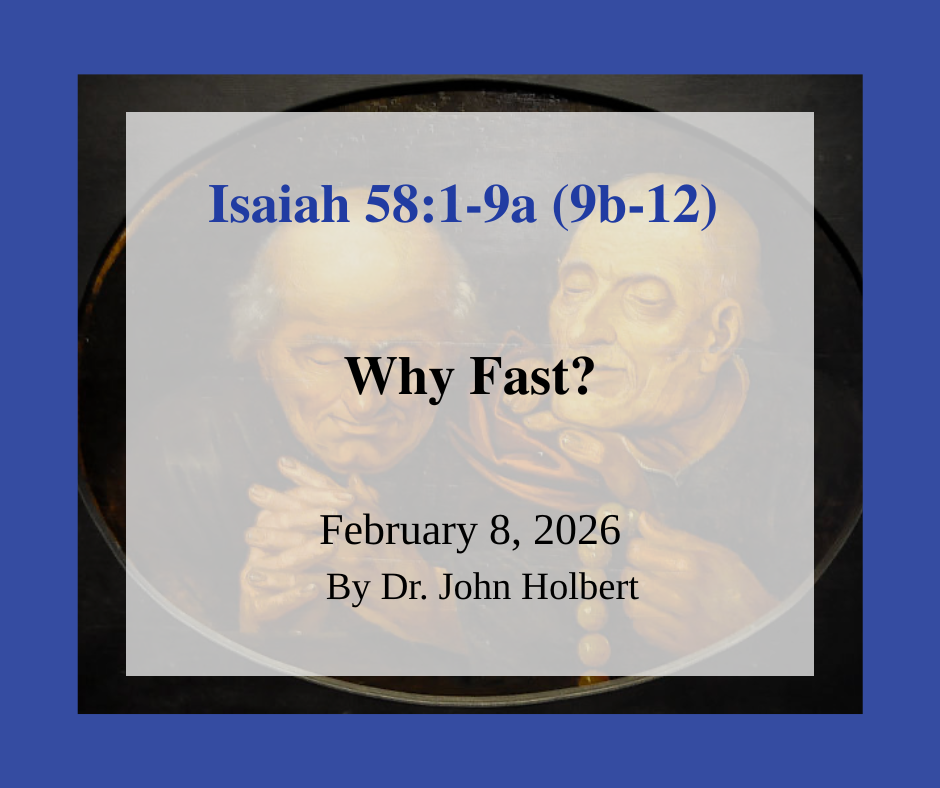Why Fast? - Reflections on Isaiah 58:1-9a (9b-12), Epiphany 5, Year A
by John C. Holbert on Tuesday, November 25, 2025

The act of fasting has long been a significant spiritual practice in any number of religious traditions. Whether Jewish, Christian, Muslim, Jain, Hindu, or many other faith traditions, fasting has regularly played a central role in the practice of those institutions. And in some cases, fasting has been presented as an act of extreme conviction, a crucial part of fulfilling the demands laid out in that particular rite. Fasting is based often on the fasting practice of the religion’s founder. For example, In Judaism Moses performed a 40-day fast on the sacred mountain (Ex.24:28; Deut.9:9-10) in order to prepare himself for a meeting with YHWH. Likewise, Jesus is said to have fasted for 40 days in the wilderness, during which he encountered and bested Satan, the fast apparently preparing him for the spiritual struggle, specifically creating in him a terrible hunger, against which Satan offers him bread, which Jesus refuses (Mt.4:2). Paul, too, speaks of fasting as a mark of a true apostle. In 2 Cor.6:4-5 he speaks of hunger, but whether he means natural hunger or deliberate abstinence is not clear. But in 2 Cor.11:27-28, Christian actions include “hunger and thirst,” with the implication that voluntary fasting is indicated. In short, fasting is an established practice in Judaism and Christianity. In a brief essay, I cannot enumerate similar practice in other traditions, but they do exist.
However, even these few examples suggest an important problem with fasting, a problem that also arises with any spiritual endeavor. Fasting can be abused in multiple ways. It may easily become a smokescreen for those who only pretend to be acting in response to a divine impulse. Indeed, Jesus upbraids some fasters who are doing so only because they want to appear pious, thereby implying that such fasting is false no matter how haggard and hungry the practitioners appear. Indeed, at Mt.11:18, Jesus speaks with harshness about the misuse of fasting for particular ideological purposes: “For John came neither eating nor drinking, and they say, ‘He has a demon’; the Son of Man came eating and drinking, and they say, ‘Look! A drunkard and a glutton.’ Jesus’ antagonists here suggest that John’s fasting is demonic, while Jesus’s lack of fasting makes him a wastral. Thus, fasting in and of itself proves little. Still, fasting was an established mode of spiritual behavior, particularly in Judaism.
But even there, fasting can be merely a rote event, signifying very little. So it is in Is.58, a premier example of fasting gone awry. In a passage that promises to provide examples of Israel’s inveterate rebellion and sin (Is.58:1), Isaiah resorts to his familiar use of sarcasm to illustrate the misuse of religious practices evidenced by these recalcitrant people. “Day after day they seek me,” says YHWH, “as if they were a nation that (truly) practiced righteousness (which they do not!)! They ask of me righteous judgments; they delight to draw near to God” (Is.58:3). In the earlier book of 1-Isaiah, that prophet, perhaps 200 years before the one we are reading, spoke similarly about the sinning people of Israel, calling them “people of Gemorrah,” and making plain that their so-called worship of YHWH was nothing more than a sham. “Your new moons and appointed festivals, I thoroughly hate!” (Is.1:10,14). This 3-Isaiah speaks with a similar poisoned vocabulary.
He sneers at the would-be pious ones and has them say, “Why do we fast, but you do not see; why humble ourselves but you take no notice?” (Is.58:3a). Well, responds YHWH, “You serve your own interest on your fast day, while you oppress all your workers” (Is.58:3b). And there is the summary problem—this fasting has exactly nothing to do with religious practice or suggests anything like a humble response to God. “Such fasting you do today will not make your voice heard on high” (Is.58:4). This is phony fasting, designed to simulate piety, but in reality has nothing whatever to do with piety.
“Is not this the fast I choose;
to loose the bonds of injustice,
to untie the yoke’s thongs,
to let the oppressed go free,
to break every yoke?” (Is.58:6)
That is the general call of a genuine fast, but then Isaiah becomes much more specific.
“Is it (the fast) not to share your bread with the hungry,
to bring the homeless poor into your house;
when you see the naked to cover them,
and never to hide from your own kin?” (Is.58:7)
Then and only then, promises Isaiah, will YHWH respond to the call of the people: “You shall cry for help, and God will say, ‘Here I am!’” (Is.58:9). False fasts mean nothing to YHWH, however impressive they may appear to those humans who witness them.
It is amazing how easily serious attempts at pious behavior can turn into falseness and humbug! Fasting can be a preparation for divine encounter, but can also become a pathetic attempt at self-aggrandizement, presenting a phony face to the world, playing at religion, rather than truly practicing it. All religious ritual, from fasting to prayer to worship, must always be accompanied by actions of justice and righteousness, lest the rituals prove empty and vacuous. That is the “fast” that YHWH always asks for in the past as well as today.
